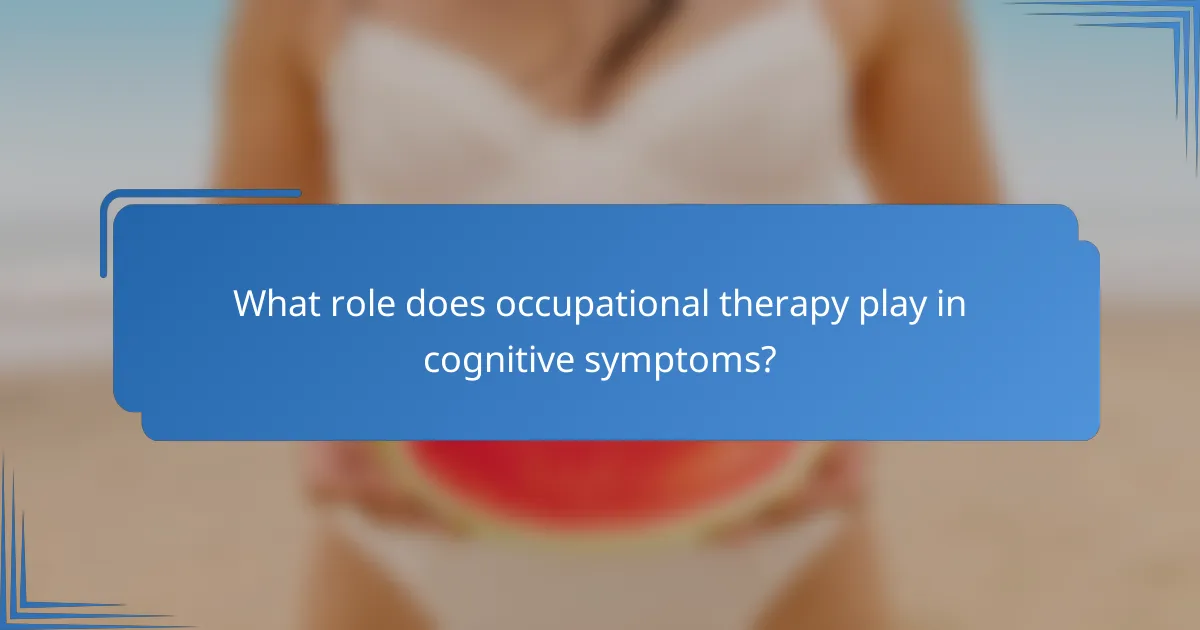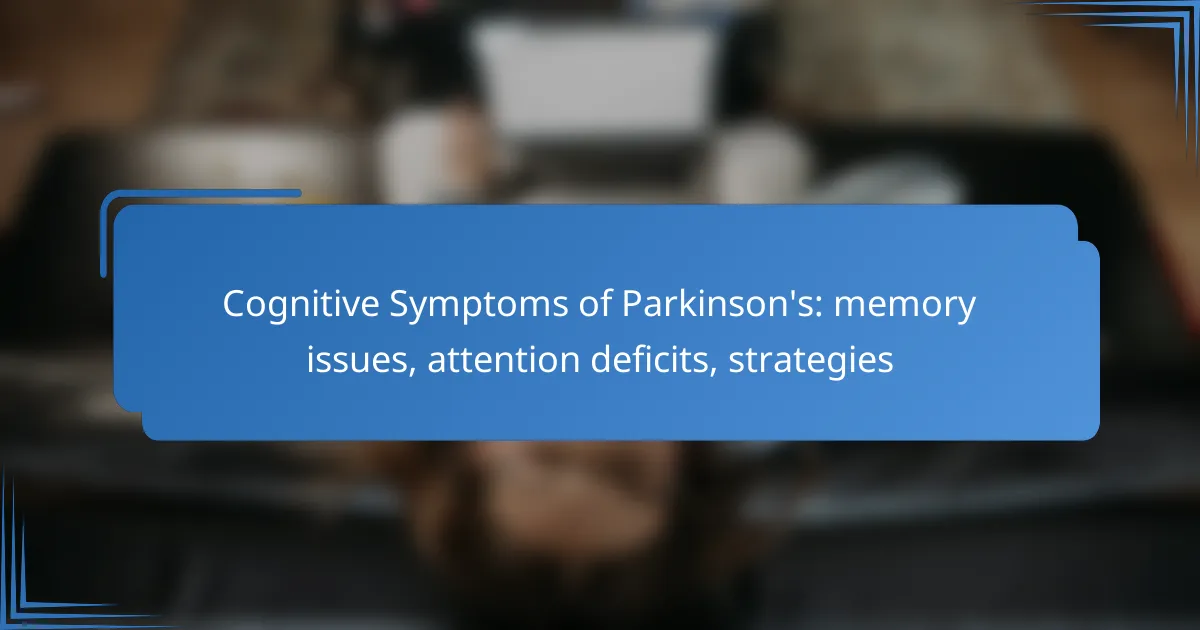Cognitive symptoms of Parkinson’s disease, including memory issues and attention deficits, can profoundly affect an individual’s daily life. In New Zealand, these challenges may hinder information processing, memory retention, and decision-making. However, various strategies such as cognitive training, medication, and mindfulness practices can help manage these symptoms and improve overall quality of life.

What are the cognitive symptoms of Parkinson’s in New Zealand?
Cognitive symptoms of Parkinson’s disease can significantly impact daily life, affecting memory, attention, and executive functions. In New Zealand, these symptoms often manifest as challenges in processing information, retaining memories, and making decisions.
Memory issues
Memory issues in Parkinson’s patients may include difficulty recalling recent events or learning new information. This can be particularly frustrating, as individuals may find themselves forgetting appointments or conversations.
To manage memory problems, it can be helpful to use external aids such as calendars, reminder apps, or notebooks. Establishing a routine can also assist in reinforcing memory retention.
Attention deficits
Attention deficits are common in individuals with Parkinson’s, making it hard to focus on tasks or conversations. Patients may struggle with multitasking or become easily distracted by their environment.
To improve attention, breaking tasks into smaller steps and minimizing distractions can be effective. Techniques such as mindfulness or short breaks during activities may also enhance concentration.
Executive function challenges
Executive function challenges involve difficulties in planning, organizing, and problem-solving. People with Parkinson’s may find it hard to initiate tasks or manage time effectively.
Utilizing checklists and visual aids can help in organizing tasks. Setting specific, achievable goals can also provide structure and clarity, making it easier to navigate daily responsibilities.

How can memory issues in Parkinson’s be managed?
Memory issues in Parkinson’s can be managed through a combination of cognitive training, medication, and the use of memory aids. These strategies help improve cognitive function and support daily activities, enhancing overall quality of life.
Cognitive training exercises
Cognitive training exercises focus on enhancing memory and attention through structured activities. These can include puzzles, memory games, and brain teasers that stimulate mental processes and improve cognitive flexibility.
Regular practice, ideally for about 20-30 minutes several times a week, can lead to noticeable improvements. Engaging in group activities can also provide social interaction, which is beneficial for mental health.
Medication options
Medication for cognitive symptoms in Parkinson’s may include cholinesterase inhibitors, which can help improve memory and attention. These medications work by increasing levels of neurotransmitters involved in memory processes.
Consulting with a healthcare provider is essential to determine the most suitable medication, as responses can vary. Monitoring for side effects and adjusting dosages is often necessary to achieve the best outcomes.
Memory aids and tools
Memory aids and tools can significantly assist individuals with Parkinson’s in managing memory issues. Simple strategies include using calendars, to-do lists, and reminder apps to keep track of important tasks and appointments.
Visual cues, such as sticky notes placed in prominent locations, can also serve as effective reminders. Additionally, utilizing digital tools like smartphones or tablets with built-in reminders can enhance organization and reduce forgetfulness.

What strategies improve attention deficits in Parkinson’s?
Strategies to improve attention deficits in Parkinson’s focus on enhancing concentration and reducing cognitive overload. Techniques such as mindfulness practices, structured routines, and limiting distractions can significantly help manage attention challenges.
Mindfulness practices
Mindfulness practices, such as meditation and deep breathing exercises, can enhance focus and reduce stress. Engaging in these activities for just a few minutes daily can help improve cognitive function and attention span.
Consider starting with guided mindfulness sessions available through apps or local classes. Aim for sessions lasting between 5 to 15 minutes, gradually increasing the duration as comfort grows.
Structured routines
Establishing structured routines can provide predictability, which is beneficial for managing attention deficits. Consistent daily schedules help reduce cognitive load by minimizing the need for decision-making throughout the day.
Try to create a daily timetable that includes specific times for tasks, meals, and relaxation. This can help reinforce memory and attention by creating familiar patterns, making it easier to focus on each activity.
Limit distractions
Limiting distractions is crucial for improving attention in individuals with Parkinson’s. Identify common distractions in your environment, such as noise, clutter, or digital notifications, and take steps to minimize them.
For instance, create a dedicated workspace free from interruptions and set specific times to check emails or messages. Using tools like noise-canceling headphones or apps that block distracting websites can further enhance concentration.

What role does occupational therapy play in cognitive symptoms?
Occupational therapy plays a crucial role in addressing cognitive symptoms of Parkinson’s, such as memory issues and attention deficits. Therapists work with individuals to develop personalized strategies that enhance cognitive functioning and improve daily living activities.
Personalized cognitive rehabilitation
Personalized cognitive rehabilitation focuses on tailored exercises and activities designed to strengthen memory and attention skills. Therapists assess each individual’s specific challenges and create customized plans that may include memory games, problem-solving tasks, and organizational strategies.
For example, a therapist might use digital tools or paper-based exercises to help a patient practice recalling information or following multi-step instructions. Regular practice can lead to gradual improvements in cognitive abilities, making daily tasks more manageable.
Daily living skills support
Occupational therapy also provides support for daily living skills, helping individuals with Parkinson’s maintain independence. Therapists teach adaptive techniques for tasks such as cooking, managing finances, and using technology, which can be affected by cognitive symptoms.
Strategies may include using visual reminders, simplifying tasks into smaller steps, or employing assistive devices. For instance, a patient might use a calendar app with alerts to help remember appointments or medication schedules, enhancing their ability to manage daily responsibilities effectively.

How do lifestyle changes impact cognitive health in Parkinson’s?
Lifestyle changes can significantly enhance cognitive health in individuals with Parkinson’s disease. Adjustments in diet, physical activity, and social interactions can help mitigate cognitive symptoms such as memory issues and attention deficits.
Dietary adjustments
Diet plays a crucial role in cognitive health for those with Parkinson’s. A balanced diet rich in antioxidants, omega-3 fatty acids, and vitamins can support brain function. Foods such as fatty fish, nuts, fruits, and vegetables are beneficial.
Consider incorporating foods that may reduce inflammation and oxidative stress, which are linked to cognitive decline. A Mediterranean-style diet is often recommended, emphasizing whole grains, healthy fats, and lean proteins.
Physical exercise benefits
Regular physical exercise is vital for maintaining cognitive health in Parkinson’s patients. Engaging in aerobic activities, strength training, and flexibility exercises can enhance blood flow to the brain and improve overall cognitive function.
Aim for at least 150 minutes of moderate-intensity exercise per week, which can include walking, swimming, or cycling. Consistency is key, as even short bursts of activity can yield cognitive benefits.
Social engagement importance
Social engagement is essential for cognitive well-being in individuals with Parkinson’s. Maintaining social connections can reduce feelings of isolation and depression, which can negatively impact cognitive health.
Participating in group activities, clubs, or support groups can foster social interaction. Aim to engage in social activities several times a week to promote mental stimulation and emotional support.

What are the emerging trends in Parkinson’s cognitive research?
Emerging trends in Parkinson’s cognitive research focus on understanding the cognitive symptoms associated with the disease, including memory issues and attention deficits. Researchers are exploring neuroprotective therapies and cognitive training strategies to enhance cognitive function and mitigate these symptoms.
Neuroprotective therapies
Neuroprotective therapies aim to slow the progression of cognitive decline in Parkinson’s patients by protecting neurons from damage. These therapies may include medications that target neurotransmitter systems, antioxidants, and anti-inflammatory agents. Ongoing clinical trials are evaluating their efficacy and safety.
Examples of neuroprotective agents include drugs like rasagiline and selegiline, which may help preserve cognitive function. Patients should consult their healthcare providers to discuss potential benefits and risks associated with these treatments, as responses can vary significantly among individuals.
In addition to pharmacological approaches, lifestyle factors such as diet and exercise are being investigated for their neuroprotective effects. Engaging in regular physical activity and consuming a diet rich in antioxidants may support overall brain health and cognitive function in Parkinson’s patients.
